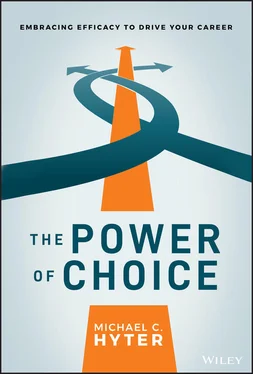I also want to express my appreciation to Marc Wallace, Audra Bohannon, and Verna Ford for making these important principles come to life for so many companies and individuals. Marc, Audra, and Verna were among the first thought‐leaders at J. Howard and Associates, and we still hear from past participants about how significant and beneficial the experience was for their careers. Over the years, Marc, Audra, and Verna, along with all our facilitators, have continued to expand the ideas of Efficacy and their application. For instance, Verna added the concept of the three types of confidence—technical, influential, and relational—that has profoundly shaped how we talk about the skills that are important to navigating a career. Audra has helped evolve our understanding of the power of making conscious choices.
Writing a book that captures the strategies and impact of this powerful approach to development isn't an easy task. I could not have done this alone. Many of my colleagues—Kameelah Benjamin‐Fuller, Jan Clarkson, Jorge Farias, Diane Johnson, Luisa Kurtz, Kristine Perez‐Foley, and Barbara Smith—gave their support by reading the first version of this manuscript and providing feedback along the way. Kameelah also conducted some of the interviews, and Jan did an outstanding job of pulling that information into the real‐world examples in the final section of the book. Barbara helped me craft the guidelines for putting Efficacy principles into action that appear at the end of each chapter. When it was time to update the book, JT Saunders and Anna Isabelle Vivas navigated us through the twists and turns of making revisions—no easy task in the midst of our busy and rewarding client service activities.
I also had the support of many folks outside Korn Ferry. They contributed by recounting their stories—both their successes and tough lessons. They reviewed manuscript drafts and helped me bring the Power of Choice alive. To protect their confidentiality, I'm not going to list their names here, but I hope you know who you are and what a difference you made.
Of course, I thank my wife, Tisha, for all of her patience and support during this project (and the three years of planning). I will be forever grateful.
Finally, every project like this one requires an anchor who brings it all together. Kathy Lenox was my right hand throughout this process. Kathy has been a longtime contributor to our company and a strong partner of mine on many projects over the years. Our mutual passion and commitment to this body of work is strong and very much aligned. Her support in helping me with the writing and editing, managing the process with all of its moving parts, and keeping me on schedule has made all the difference. I can't really express in words how much her partnership has meant to me, but I'm happy to say that we got this done and it's all good! Thank you, Kathy.
I HAVE FOCUSED MY CAREER on supporting the talent development of a vibrant and diverse workforce. This work means that I have the opportunity to speak to large numbers of up‐and‐coming professionals who are eager to make their mark and navigate through a successful career. These individuals are hungry for practical advice about how to accomplish the goals that are important to them. Many think of themselves as—or are considered by others to be—“different” from the majority of employees in their organizations.
In talking with these rising professionals, who come from a wide variety of backgrounds and an array of industries, I encounter an interesting ambivalence about the relevance of differences in today's multicultural workforce. On one hand, there are countless people from different ethnic backgrounds, races, gender, cultures, sexual orientations, and religions, all of whom are living their dreams that they achieved through their own hard work, intentionality, and support from others. This is a true sign of progress.
On the other hand, these same differences are still causing debate and division. In spite of a changing population and expanding opportunities, I still hear concerns about the impact of being different when it comes to being recognized and rewarded in the workplace. Many professionals look around and don't see many individuals like themselves in senior management. They notice that their careers aren't progressing as they expected or as quickly as their colleagues'. They see others like themselves leaving the company for unclear reasons or “better” opportunities.
As these hard‐working professionals make these observations—and when they encounter the inevitable challenges or setbacks of a demanding career—questions begin to emerge: Do I have to work twice as hard as my counterparts to receive the same recognition and opportunities? Do I have to sacrifice who I am in order to fit in? These kinds of questions, sometimes raised overtly but more often unspoken, add another level of complexity—and distraction—to the challenge of managing a rewarding and satisfying career.
I've wrestled with these and other questions throughout my own career. I grew up in Detroit, Michigan, during the 1960s. When I graduated from Michigan State University in the late 1970s, I began working as an entry‐level human resource professional for a large corporation based in Detroit. I was a driven young executive who was looking to move ahead fast. Yet even after two years of working hard, I felt senior executives either couldn't see or didn't value my potential. I became cynical about the company and my future with it.
In the spring of 1980, I was invited, along with twenty‐three other professionals of color, to participate in what was then called an Efficacy course. I suspected that this seminar would be remedial. What made me show up despite my reservations was that I had previously heard the speaker, Dr. Jeff Howard. Most Black leaders of the day spoke about people of color as victims—a largely white society was to blame for what we didn't achieve. Not Dr. Howard. His focus was squarely on taking personal responsibility for one's own development. He didn't talk about what was wrong with other people or what the company ought to be doing differently. He told us that our success depended upon ourselves and the choices we made about how to think and behave. I was riveted by this thinking. Was it really up to me?
During the training, Dr. Howard elaborated on the topic of personal responsibility, and the meaning of what he called Efficacy became clearer to me. The American Heritage Dictionary defines efficacy as the “power or capacity to produce a desired effect.” In the context of the program, efficacy also means “a set of thoughts and behaviors that give you the highest return on the investment of your time and effort.”
I was struck that the definition didn't say a good return or a high return, but the highest return. Efficacy was about leveraging my choices and my effort to maximize my development and not settling for less than I was capable of. It was about being strategic with that effort: defining what was important to me and developing a strategy that would produce the best outcomes with the least amount of wasted physical or emotional energy.
This experience had a profound impact on me. It helped me realize that I was concentrating much of my energy on what others weren't doing right: they weren't giving me a chance, they weren't appreciating what I had to offer, and they weren't treating me as someone with a brain. A key principle of the program is, It's not the stimulus, it's the response. This made it clear that I could choose how to respond to my environment and people I encounter every day. I did not have to let frustration, anger, or helplessness dictate my reaction. I could choose to respond to the unfortunate and unpleasant experiences of life, in a way that expanded my possibilities and moved me toward my desired outcomes. To this day, that core principle rings in my head whenever a situation isn't progressing the way I would like it to.
Читать дальше












